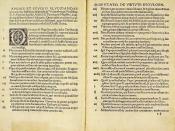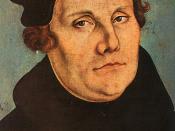Martin Luther had a problem with the Roman Catholic Church and his grievances against the Church arose gradually throughout his life. His main objection was over the selling of indulgences, which led to the completion of his Ninety-Five Theses. The Ninety-Five Theses was an indictment of the wrong doings of the Roman Catholic Church, particularly the widespread practice of selling indulgences in association with the sacrament of penance. Luther's beliefs on the matter were that after confession, absolution relied upon the sinner's faith and God's will alone rather than the intervention of a priest. (Rogers 420) But when Luther nailed his Ninety-five Theses to the door of the church at Wittenberg, he didn't know that he would be establishing another religion known as Protestantism. Luther's main changes dealt with the sacraments, justification by faith alone, Christian nobility, and spiritual liberty and servitude. Luther may have been a reformist in the fact that he wanted to change the ways of the Church, but since the Church did not want change and he still forced the issue, he became a revolutionist.
For Luther, the Eucharist of Lord's supper was really a symbolic act rather than an actual instance of transubstantiation in which the bread and wine actually become the body and blood of Christ. According to the Church, the bread and wine may have the appearance of such, but their inner substances have literally become the flesh and blood of Christ. This was the magical aspect to this sacrament, which Luther could not accept. As Luther saw it, no sacrament is effective by itself without the Word of God associated with the sacrament. Consequently, Luther's teachings on the sacraments took away the power of the priests and the special nature of the Eucharist. The power of the clergy could not exist if...



Hey.
I think Martin Luther was all in one depending on the angle u look at it. Left to me I think he was a revolutionist and that was why he was assisinated. That's just my own personal view.
1 out of 1 people found this comment useful.